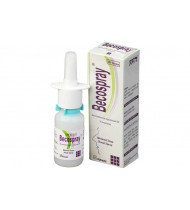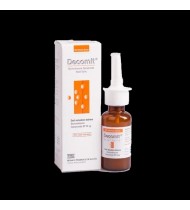Beclomethasone Dipropionate (Nasal Spray)
Indications
Prophylaxis and treatment of seasonal & perennial allergic rhinitis including hay fever & non-allergic (vasomotor) rhinitis. Prevention of recurrence of nasal polyps following surgical removal.
Pharmacology
Following topical administration into the nasal mucosa, Beclomethasone Dipropionate produces anti-inflammatory and vasoconstrictor effects. The exact mechanism of these actions remain unknown, but may involve reductions in the following: number of mediator cells (basophil, leukocytes and mast cells) at the epithelial level, number of eosinophils, sensitivity of sensory nerves to mechanical stimuli, secretory response to cholinergic receptor stimulation, and fibroblast activity. Other mechanisms may involve inhibition of capillary dilation and permeability, stabilization of lysosomal membranes and subsequent prevention of release of proteolytic enzymes.
Dosage
Dosage of intranasal Beclomethasone Dipropionate must be carefully adjusted according to individual requirements and response.
Adults: Recommended usual dosage: 02 (two) sprays (50 µgm/spray) in each nostril twice daily. For some patients, 01 (one) spray in each nostril 3 to 4 times daily may be preferred. Total daily doses of 400 µgm (08 sprays) should not generally be exceeded.
Children (6 to 12 years of age): Usual dose: 01 (one) spray in each nostril twice daily. Patients not adequately responding, or those with more severe symptoms may use 02 (two) sprays in each nostril twice daily.
Children under 6 years of age: Not recommended since safety profile studies have not been conducted. After the first few days, patients may be able to reduce their dosage to 100 µg (one spray in each nostril) once daily for maintenance therapy.
Adults: Recommended usual dosage: 02 (two) sprays (50 µgm/spray) in each nostril twice daily. For some patients, 01 (one) spray in each nostril 3 to 4 times daily may be preferred. Total daily doses of 400 µgm (08 sprays) should not generally be exceeded.
Children (6 to 12 years of age): Usual dose: 01 (one) spray in each nostril twice daily. Patients not adequately responding, or those with more severe symptoms may use 02 (two) sprays in each nostril twice daily.
Children under 6 years of age: Not recommended since safety profile studies have not been conducted. After the first few days, patients may be able to reduce their dosage to 100 µg (one spray in each nostril) once daily for maintenance therapy.
Administration
How to use the Nasal Spray-
- Shake the bottle gently and remove the dust cover.
- Hold the spray with your forefinger and middle finger on either side of the nozzle and your thumb underneath the bottle. Press down until a fine spray appears. If using for the first time or if you have not used it for a week or more, press the nasal applicator several times until a fine moist comes out from the container.
- Gently blow the nose to clear the nostrils.
- Close one nostril and carefully insert the nasal applicator into the open nostril. Tilt your head forward slightly and keep the spray upright. Breathe in through your nose and while breathing in, press the white-collar of nasal applicator firmly down once to release a spray.
- Breathe out through your mouth.
- Repeat the above steps in the same/other nostril for consecutive doses.
- Remove the dust cover.
- Gently pull off the nasal applicator.
- Wash the applicator and dust cover in warm water.
- Shake off the excess water and leave to dry in a normal place. Avoid to apply additional heat.
- Gently push the applicator back on the top of the bottle and re-fix the dust cover.
Interaction
None is known.
Contraindications
Contraindicated in patients with a history of hypersensitivity to any of its components. Infections of the nasal passages and paranasal sinuses should be appropriately treated but do not constitute a specific contraindication to treatment with Beclomethasone nasal spray.
Side Effects
Rare instances of nasal septum perforation have been reported following intranasal administration. As with other nasal sprays, dryness and irritation of the nose and throat, unpleasant taste & smell and epistaxis have been reported rarely. Rare instances of wheezing, cataracts, glaucoma and increased intra-ocular pressure have been reported following the intranasal use of Beclomethasone.
Pregnancy & Lactation
Beclomethasone should be used during pregnancy, if the potential benefit justifies the potential risks to fetus. In addition, as there is natural increase in corticosteroid production during pregnancy, most women will require a lower exogenous corticosteroid dose and many will not need corticosteroid treatment during pregnancy. As other corticosteroids are excreted in human milk, caution should be exercised when Beclomethasone nasal spray is administered to a nursing woman.
Precautions & Warnings
Infections of the nasal passages and paranasal sinuses should be appropriately treated but do not constitute a specific contraindication to treatment with Beclometasone nasal spray. Care must be taken while transferring patients from systemic steroid to Beclometasone Nasal spray if there is any reason to suppose that their adrenal function is impaired.
Overdose Effects
Inhalation of excessive doses over a short time period may suppress hypothalamic pituitary adrenal (HPA) function, and no special emergency action need to be taken, rather treatment should be continued at recommended dose. HPA function recovers within one or two day
Therapeutic Class
Nasal Steroid Preparations
Storage Conditions
Store at a temperature not exceeding 30˚ C. Protect from light & moisture. Keep out of the reach of children.
Becospray Nasal Spray 200 metered sprays
IndicationsProphylaxis and treatment of seasonal & perennial allergic rhinitis including hay fev..
146.00Tk.
Decomit Nasal Spray 200 metered spray
IndicationsProphylaxis and treatment of seasonal & perennial allergic rhinitis including hay fev..
146.00Tk.
Showing 1 to 2 of 2 (1 Pages)


